From pennies to premium: How a 9x entrepreneur transformed Sa Huynh salt into a global delicacy
Once deemed "worth less than a bowl of pho," Sa Huynh salt has undergone a remarkable transformation thanks to Pham Hong Tham, who increased its value a thousandfold and brought it to the international market.
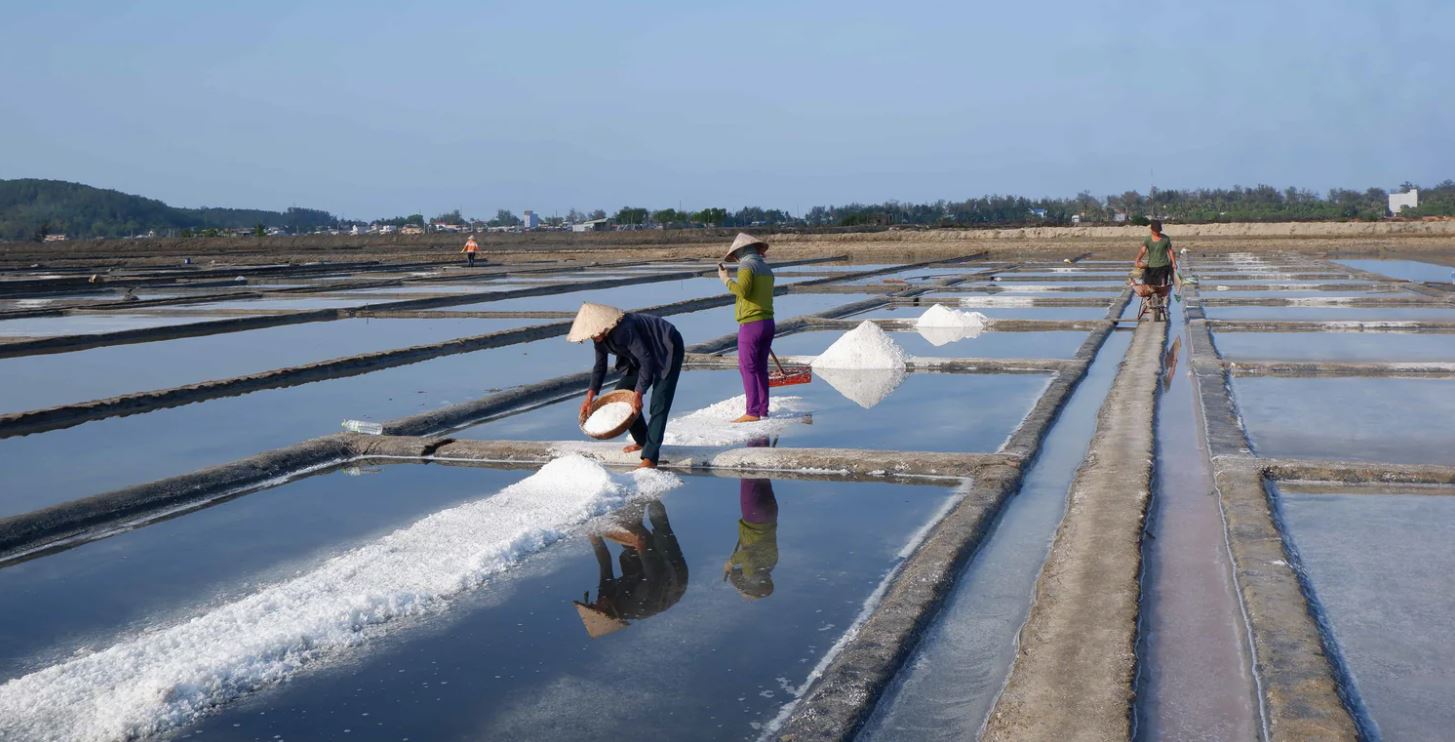 |
Salt farmers working on earthen fields. Photo: NVCC |
Salt farmers working on earthen fields. Photo: NVCC
In early August, Pham Hong Tham (born in 1993) finished leading a salt field tour and immediately turned her attention to hundreds of online orders. After appearing on the reality TV show "Gia dinh HaHa" (The HaHa Family), the "salt entrepreneur" became a social media sensation, simultaneously promoting the beauty of Quang Ngai province. Searches for "Sahu salt" and "Sahu flower salt" quickly topped search engine results.
2025 marks 10 years since Tham embarked on her mission to revolutionize salt production. From a commodity priced at 200 VND per kilogram, Sa Huynh salt has become a specialty product fetching nearly 200,000 VND, even finding its way onto Amazon, the billion-dollar e-commerce platform.
Turning raw salt into "white gold"
Tham grew up in Sa Huynh, Quang Ngai, home to central Vietnam's oldest salt fields. Though her family wasn't involved in salt production, she always held a special affection for this gift from the sea. She remembers her childhood days spent wandering the salt fields after school, searching for the largest crystals to catch the sunlight.
This love stayed with her into adulthood. In 2025, fresh out of university, Tham read an article lamenting that "100 kg of salt couldn’t buy a bowl of pho." "It was heartbreaking to see a source of local pride valued so cheaply," she said.
Driven by this concern, Tham decided to forgo her law degree and return home to launch a salt business.
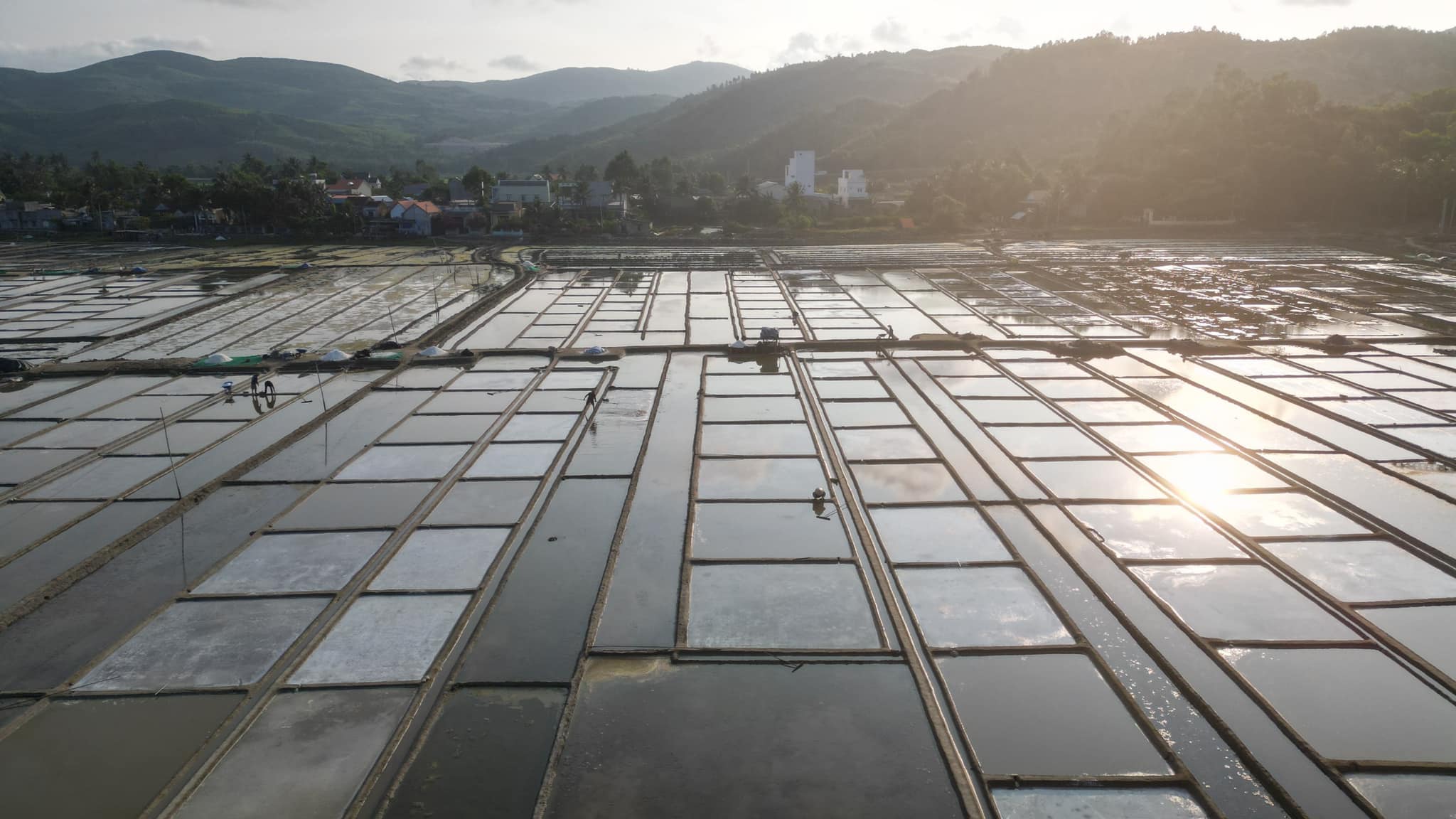 |
Sa Huynh salt fields. Photo: NVCC |
Sa Huynh salt fields. Photo: NVCC
Tham began by researching and improving the production process, establishing standards to enhance product quality. The traditional salt-making process in Sa Huynh, dating back to the 19th century, involves channeling seawater into earthen fields, where it crystallizes under the sun after 2 to 4 days. Some farmers had adopted nylon sheets to increase yield and prevent soil contamination, but this resulted in overly salty crystals, unsuitable for modern consumers who prefer a milder, naturally sweet flavor.
Understanding that quality was key to increasing value, Tham focused on production. "I visited every house, every field, urging farmers to return to earthen fields and produce the finest salt," she recalled. To ensure purity, salt farmers now begin work between 4 and 5 a.m., harvesting only when the sun is at its peak and the crystals turn from translucent to opaque white. The harvested salt is then mechanically sifted and hand-sorted to remove any remaining impurities.
Despite understanding the benefits, many farmers were hesitant to change. Tham persuaded them by offering a stable price of 1,000 VND per kilogram, eight times the previous rate of 200 VND.
Initially, only two families agreed, "more out of family loyalty than faith in the project," Tham admitted. However, the earthen method proved successful, yielding a higher quality salt that sold for 16,000 VND per kilogram, an 800-fold increase. Eight more families soon adopted the new method, ensuring a steady supply.
By the end of 2015, nearly a year after Tham began her quest for quality salt, the Sahu brand was born.
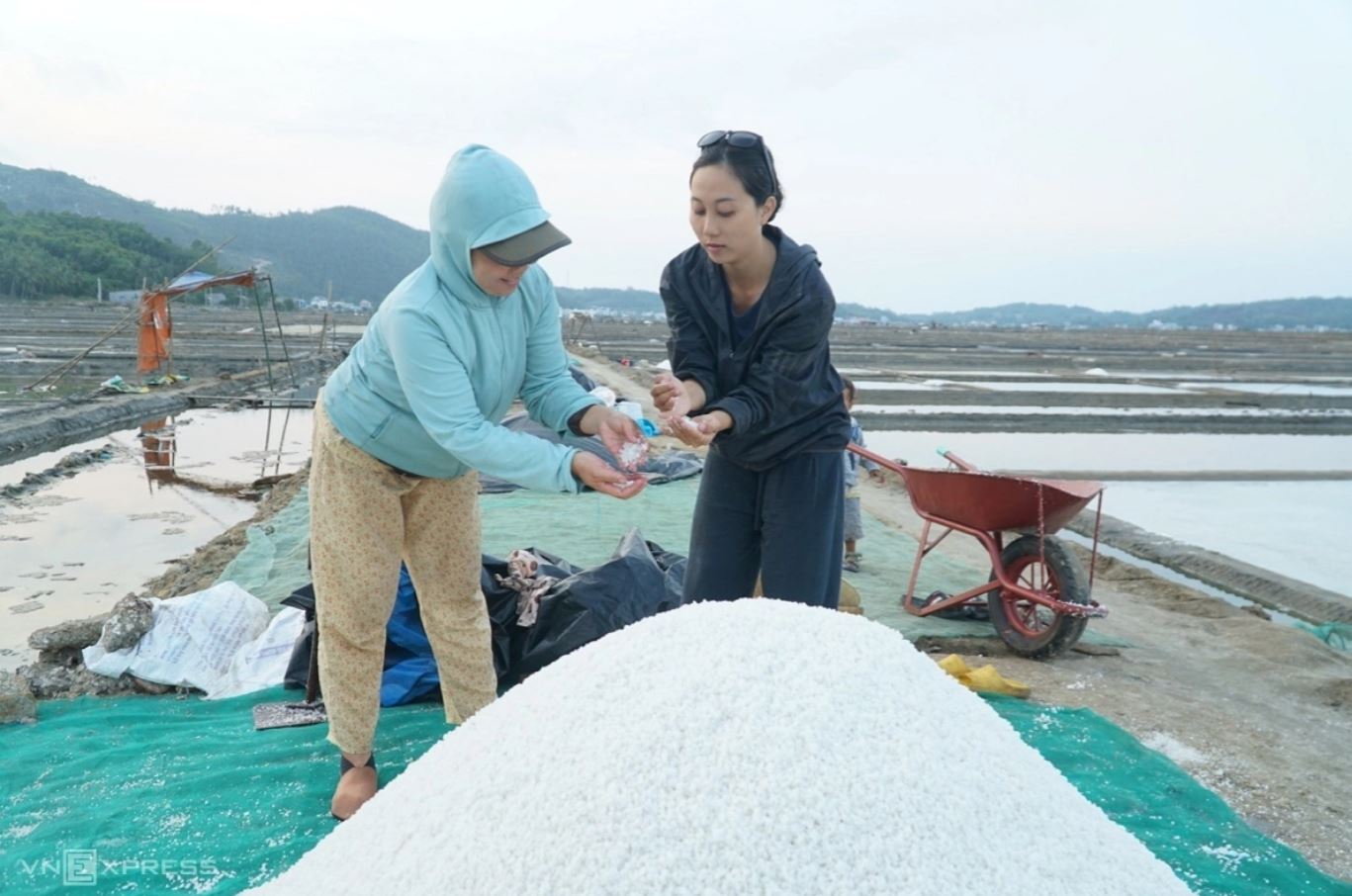 |
Pham Hong Tham (right) purchasing salt from farmers. Photo: Pham Linh |
Pham Hong Tham (right) purchasing salt from farmers. Photo: Pham Linh
Tham expanded beyond basic salt, developing a range of flavorful and healthy products like baked salt and bamboo salt. For baked salt, she sourced clay pots from Bien Hoa and Binh Thuan, areas with mountain clay far from industrial zones, ensuring food safety. The raw salt is baked at high temperatures in these pots, removing moisture and impurities. Baked salt sells for around 52,000 VND per kilogram.
Sahu bamboo salt is made by stuffing raw salt into fresh bamboo tubes and baking them for 12 to 16 hours. The subtle bamboo aroma and rich flavor have made it popular with chefs in South Korea and Japan, commanding a price of nearly 100,000 VND per kilogram.
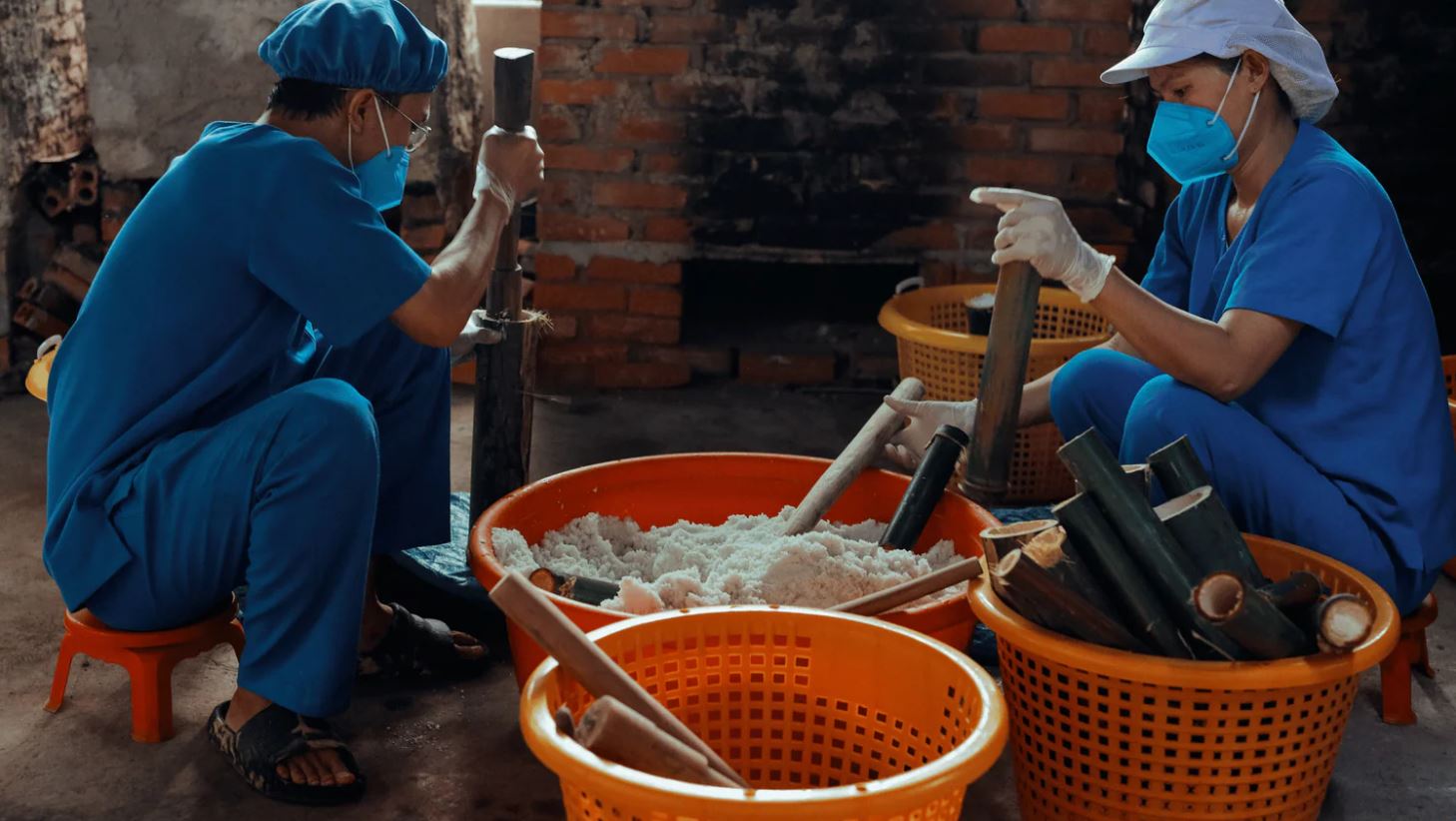 |
Bamboo salt production process. Photo: NVCC |
Bamboo salt production process. Photo: NVCC
To protect salt farmers from exploitation, Sahu maintains stable prices and offers bonuses based on quality and weather conditions. During lean years, the purchase price has reached as high as 200,000 VND per 50-kilogram bag.
Tham believes that true revolution lies in connecting with consumers. She emphasizes storytelling, weaving the narratives of salt farmers and local culture into each product.
Each jar of salt features a label depicting salt farmers in Sa Huynh, alongside the story of a single salt crystal's journey: from the sea to the fields, then to the clay pots and bamboo tubes. This allows consumers to appreciate the farmers' hard work and dedication.
Sahu also offers "a day as a salt farmer" experiences, where visitors can harvest salt, collect flower salt, and learn about the craft. This fosters a deeper appreciation for the "white gold" of Sa Huynh.
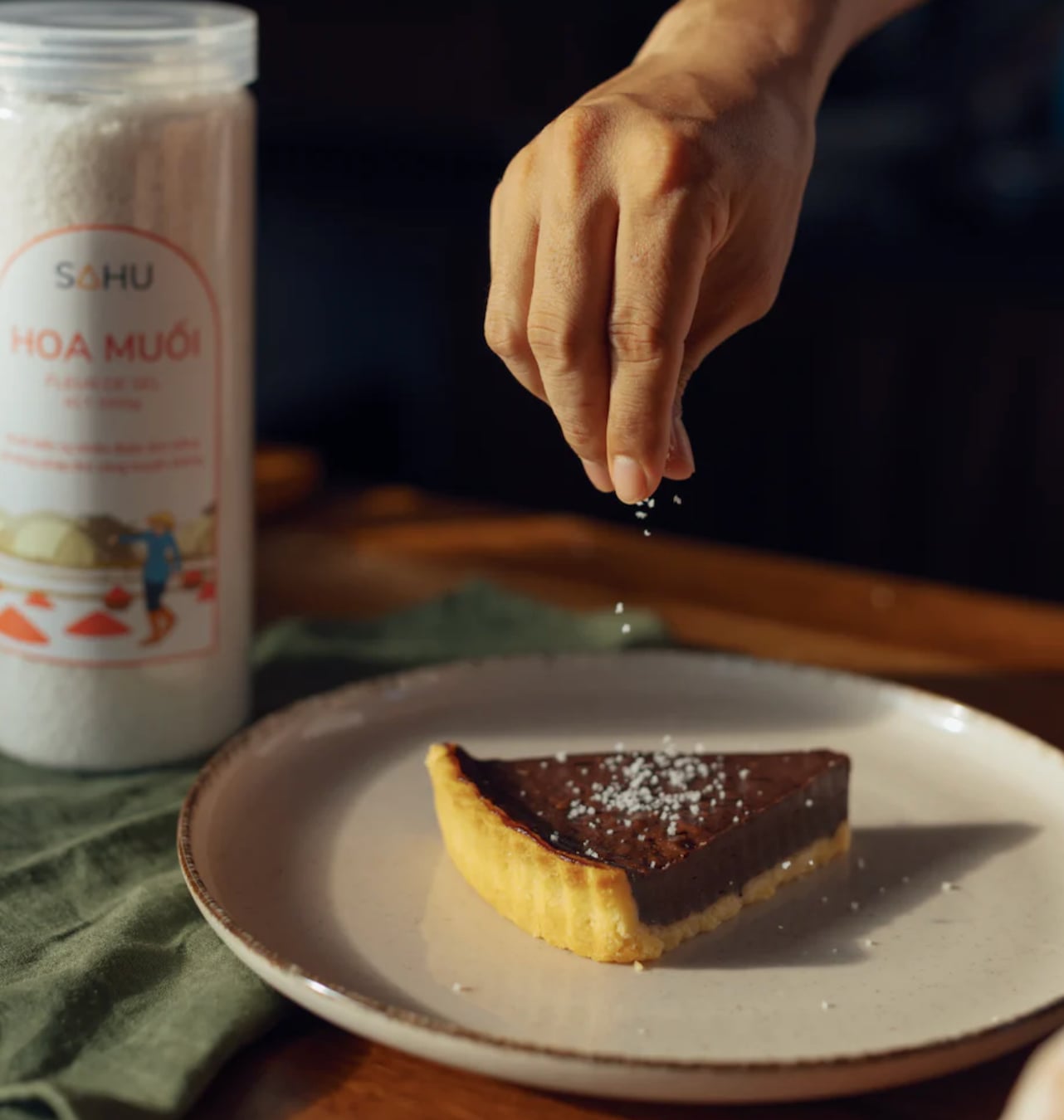 |
Flower salt enhances flavor and adds visual appeal to dishes. Photo: NVCC |
Flower salt enhances flavor and adds visual appeal to dishes. Photo: NVCC
Breaking through with "flower salt"
While Sahu had already elevated the value of salt, the real breakthrough came in 2017 with flower salt. These delicate, flaky crystals form on the surface of the brine as it evaporates. Only 1 kilogram of flower salt is produced for every 100 kilograms of regular salt. Harvesting requires meticulous timing and a gentle touch to avoid breaking the fragile crystals. Due to its high quality and low yield, flower salt is always in high demand, with some customers having to wait months to secure their order.
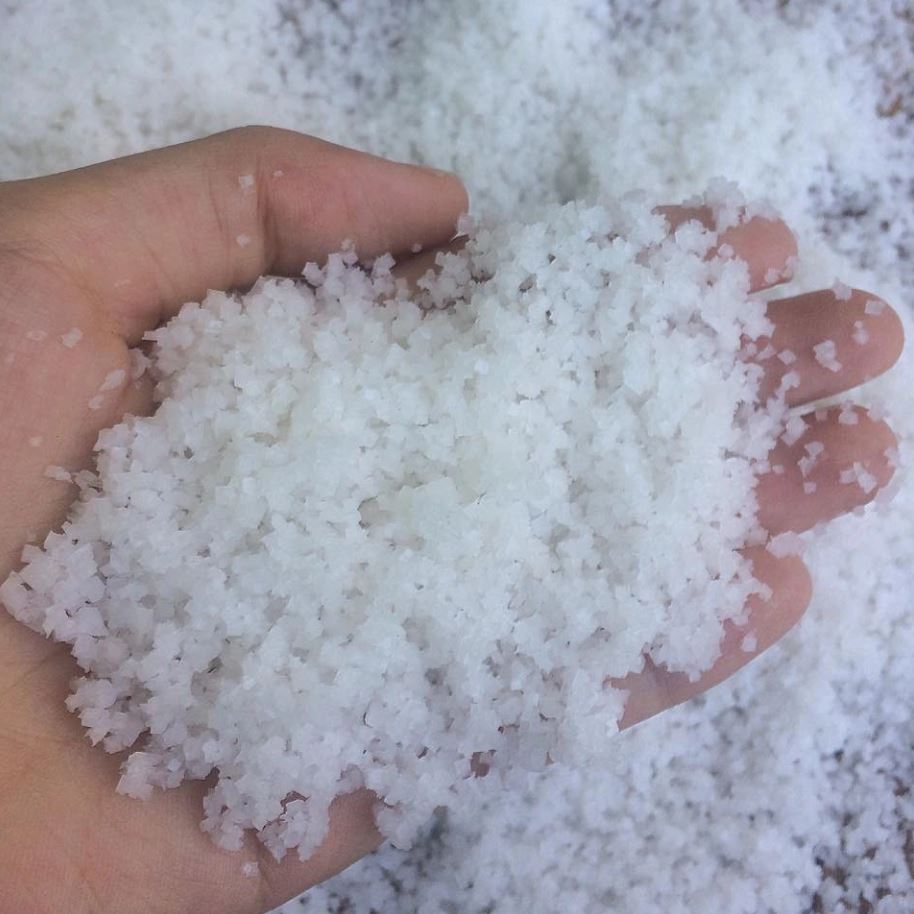 |
Sa Huynh flower salt. Photo: NVCC |
Sa Huynh flower salt. Photo: NVCC
"Flower salt production not only has economic significance but also showcases Vietnamese innovation," Tham stated. In 2022, Sahu flower salt received the 4-star OCOP (One Commune One Product) certification from Quang Ngai province. Currently, it retails for nearly 200,000 VND per kilogram, opening doors to the global market.
Sahu's success extends beyond Vietnam. In its first year, Sahu bamboo salt entered the Taiwanese market and was listed on Amazon for international customers.
Tham's salt production has expanded, now partnering with over 30 salt farming families, purchasing 4,000 50-kilogram bags of salt annually, providing stable employment for around 10 workers, and collaborating with over 30 distributors nationwide.
From livelihood to heritage preservation
Despite their success, Tham and the Sa Huynh salt farmers face challenges: urbanization, high-rise buildings blocking wind, and potential water pollution. Two of the original salt fields Tham worked with have already been lost to development.
To preserve the traditional earthen salt fields, Sahu offers experiential tours, allowing visitors to participate in salt making, enjoy local cuisine, hear stories about the craft, and explore the salt field ecosystem. This authentic atmosphere evokes the heartwarming scenes of daily life featured on "Gia dinh HaHa," where local culture is showcased through real experiences.
According to Tham, the Sa Huynh salt fields are an open architectural marvel, a system of ponds, canals, and reservoirs interacting with the sea and land, supporting both salt production and a diverse ecosystem of birds, fish, shrimp, and algae. The algae serves as food for the aquatic life, providing an alternative livelihood for salt farmers during the off-season. The salt fields also play a role in flood mitigation.
A United Nations Development Programme report states that the Sa Huynh salt fields cover approximately 115 hectares and support 550 salt-farming households. Research by the Vietnam Institute of Ecology and Biological Resources (2022) identified over 150 animal species in the area, including migratory birds and endemic aquatic creatures, contributing to coastal ecosystem stability and climate change resilience.
Numerous international studies highlight how sustainable tourism linked to heritage preservation (including traditional crafts) creates jobs, increases income, and expands local value chains. Cultural tourism accounts for about 40% of international tourism, and cultural industries contribute 3-6% to the economy in many countries.
 |
During the rainy season, the Sa Huynh salt fields become a habitat for over 150 animal species. Photo: NVCC |
During the rainy season, the Sa Huynh salt fields become a habitat for over 150 animal species. Photo: NVCC
"Traditional sea salt is inherently valuable; our product diversification simply expresses our creative passion for it. Our goal is to enhance its value at the source, ensuring the sustainable development of the salt trade and the Sa Huynh ecosystem," Tham explained.
Quang Ngai is the cradle of the Sa Huynh culture, with 26 excavated sites among over 80 discovered and studied locations. As Quang Ngai aims to make tourism a key economic sector, striving to attract 1.36 million visitors and generate 2,780 billion VND in tourism revenue, models like Sahu offer a promising path forward.
Reflecting on her 10-year journey, Tham shares her key lesson: economic value creation must go hand in hand with ecosystem preservation and cultural heritage promotion. With the right approach, even everyday salt can become a premium product, taking Vietnamese brands to the global stage.
Thai Anh
If you have a similar story about your business or know of an organization striving for innovation, please share it with us through the link here. Suitable contributions will be selected for publication on our special page, helping to inspire and spread the spirit of "rising up" to the Vietnamese business community. |












